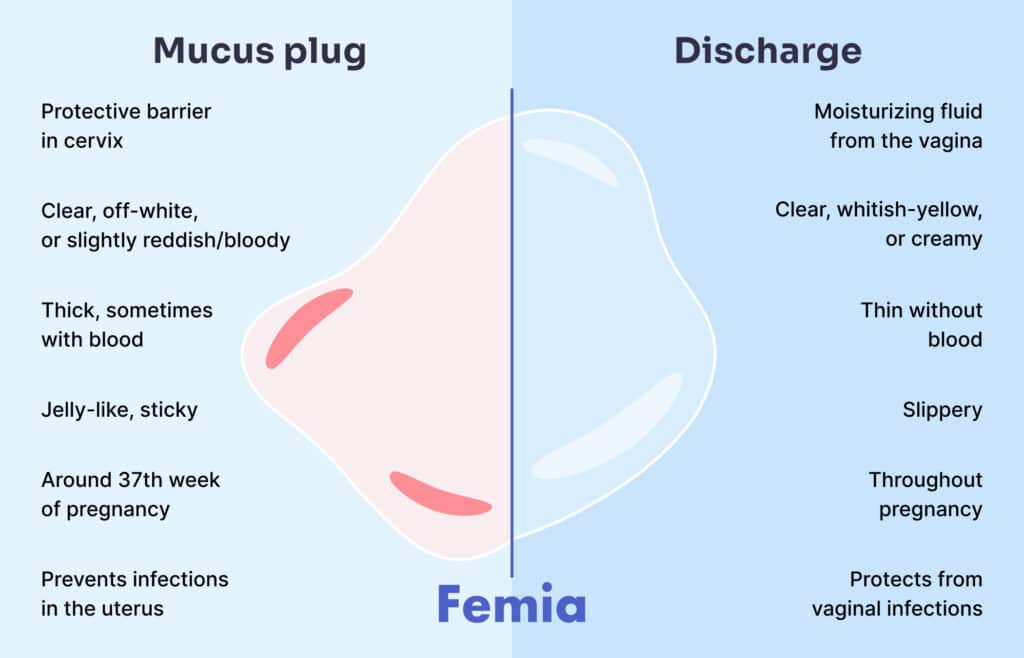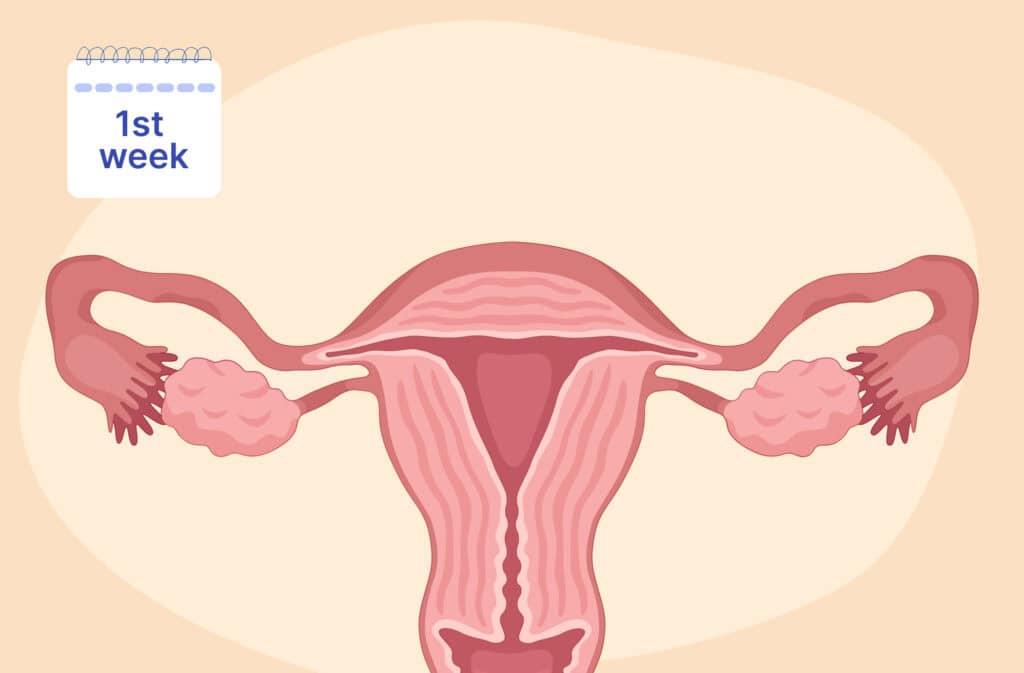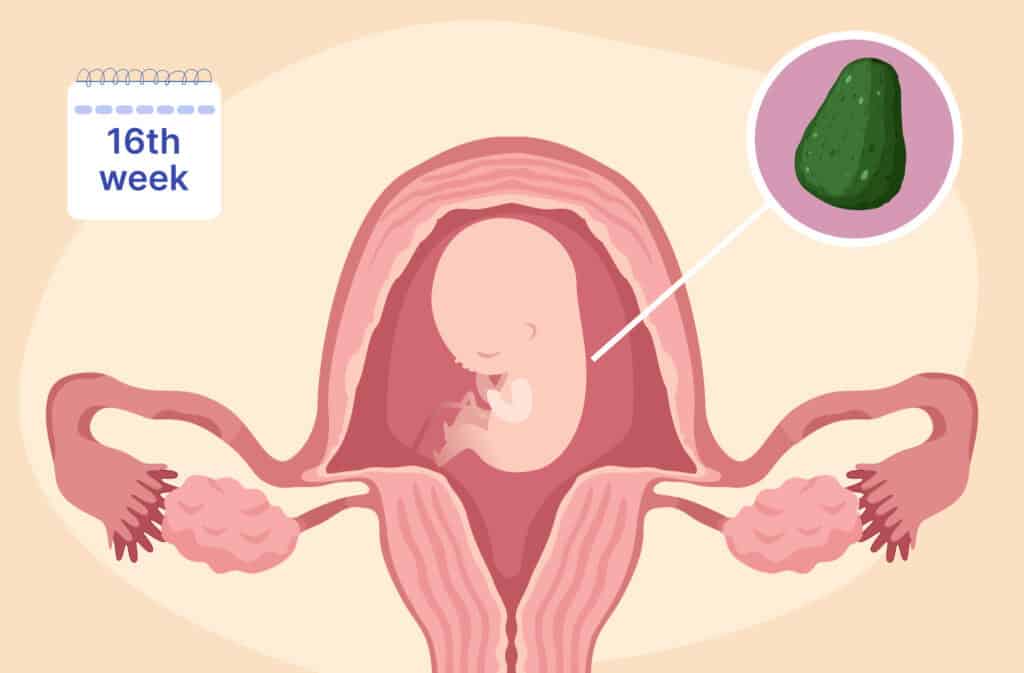Femia > Health Library > Pregnancy > Pregnancy health > Things to avoid after losing mucus plug
Things to avoid after losing mucus plug

- Updated Feb 25, 2025
- Published
CRAFTED BY HUMAN
Crafted by human At Femia, we provide accurate and up-to-date information at every stage of your journey, from trying to conceive, pregnancy and postnatal support. All content is created by a real person based on in-depth research and own professional experience. Femia ensures that you will receive expert advice, strict accuracy and a personalized approach from our authors/medical experts. Learn more about our editorial policy.
FACT CHECKED
Fact checked At Femia Health, we maintain the highest standards of editorial excellence in delivering content focused on helping you conceive, guiding you through pregnancy, and supporting you postpartum. Explore our content review principles to learn how we ensure the accuracy and quality of our health and lifestyle tips for every stage of your journey.
- Losing a mucus plug is a sign that your labor might be near, so it is important to pack your bags and stay vigilant for other signs, like frequent contractions, cramping, or water breaking.
- After losing your mucus plug, it is advised to avoid inserting anything in your vagina or engaging in intense physical activity, as it may increase the risk of infections or induce premature labor.
Did you know that in the late stage of pregnancy, there are some necessary precautions and potential things to avoid after losing the mucus plug? Losing your mucus plug is a sign that labor might be around the corner. So, be ready to head to the hospital and attentive for other labor signs.
The mucus plug is a thick, protective, jelly-like barrier around your cervix that prevents the entry of bacteria or other unwanted substances into the uterus, protecting your baby from infections. As labor approaches, your mucus plug starts to release from your vagina, making way for your baby to come out. Let’s discuss the important things to avoid after losing the mucus plug.

Mucus plug vs. discharge

It’s normal to experience vaginal discharge, even during pregnancy, so you might be wondering how to tell the difference between discharge and the mucus plug. Here are the key differences:
| Characteristics | Mucus plug | Discharge |
|---|---|---|
| What is it? | A thick, protective barrier or jelly-like substance at the opening of the cervix. | A thin fluid that releases from the vagina to keep it moist. |
| Color | Clear, off-white, or slightly reddish/bloody. | Clear, whitish-yellow, or creamy. |
| Texture | Thick with or without blood. | Thin without blood. |
| Consistency | Jelly-like and sticky. | Slippery. |
| Timings of release | Around the 37th week of pregnancy. | One to two weeks after conception to throughout pregnancy. |
| Significance | Prevents the entry of bacteria and infections into the uterus and fetus. | Protects from vaginal infections. |
What happens after you lose your mucus plug?
So, what happens if you lose your mucus plug? Let’s break it down into steps:
- As your body prepares for labor, your cervix (the lower part of your uterus) starts to change. It begins to soften, thin out (this is called “effacement”), and gradually open (dilate).
- As these changes happen, you might lose your mucus plug. This is a thick collection of mucus that has been protecting your uterus during pregnancy.
- You may notice stretching or pressure in the pelvis area after the mucus is dislodged.
- Although it’s difficult to predict the exact time of labor after mucus plug release, it typically starts within a few hours, days, or weeks. It depends on your pregnancy progression. According to the American College of Obstetricians and Gynecologists, the loss of your mucus plug isn’t a precise indicator of when labor will start.
- If labor is near, you will notice other symptoms with mucus release, like baby drop, severe cramping, the onset of frequent and strong contractions, light bleeding, or even a water break.
👉Find out more: Understanding early decelerations in fetal heart rate monitoring
Things to avoid after losing your mucus plug
After losing your mucus plug, there are certain things you should avoid doing. This is because losing mucus plug most likely indicates that your body is preparing for labor, so it is best to become extra cautious and avoid certain activities that carry health risks for you and your baby. So, here’s what to avoid after losing a mucus plug.
1. Don’t workout too hard
If you lose your mucus plug before 37 weeks of pregnancy, it’s best to avoid intense physical activities, like weight lifting, high-intensity exercises, or anything that excessively exerts your body. This is a precautionary measure to reduce any potential risks.
If you’re 37 weeks or further along when you lose your mucus plug, your approach to activity can be more flexible. However, throughout your pregnancy it’s generally recommended to stick to moderate or light physical activities. Heavy or intense exercises aren’t advised during pregnancy.
Remember, every pregnancy is unique. Your doctor knows your individual health situation best and can provide personalized advice.

2. Don’t insert anything in the vagina
Your mucus plug has been the protective barrier to prevent bacteria or infections from entering the uterus and reaching your baby.
But now, as the mucus plug is loose, there are chances of infections and bacteria traveling to your uterus. Loosening of a mucus plug doesn’t mean you will surely get an infection—it’s just a signal from your body telling you to be careful and avoid things that may risk one.
Your vagina is the leading site or opening for the entry of infections.
So, to prevent infections, it is recommended to avoid touching your vagina with fingers or putting any substance inside, like tissue or tampons. These can be the source of infections unless done by a healthcare provider with sterilized tools for internal examination or checkup.
3. Don’t bathe just anywhere
After losing your mucus plug, you can take a bath at home in a clean environment with moderate water temperature if your cervix is not dilating or your water is not broken.
However activities in the following places or conditions is not recommended, as they could pose the risk of infection:
- Unclean or contaminated water;
- Public toilets;
- Hot tubs;
- Public pools.
Hot water may harbor bacteria, and baths in hot water can increase your body temperature, which may be harmful to your baby.
Important note: Warm baths can be a relaxing treat during pregnancy, but it’s important to keep the water temperature below 37.8°C (100°F). This helps prevent overheating, which could potentially affect your baby’s health. Very hot baths or hot tubs should be avoided, but a comfortably warm bath is generally safe and can be a great way to unwind.
👉Find out more: Your pregnancy checklist: Week-by-week guide to preparing for baby
What to do when you lose your mucus plug
After you lose your mucus plug, it is important to:
- Keep an eye out for other signs of labor, like frequent, regular, and strong contractions, light bleeding, water break, baby drop, or severe cramping.
- Inform and ask one or more of your family members to stay by your side so they can help you or take you to the hospital in case of an emergency.
- Pack your bags and get ready for the hospital.
- If your water breaks, immediately go to the hospital, and if you experience other signs of labor with mucus break, it is recommended to inform your doctor.
- Keep in touch with your healthcare provider, and update them about your symptoms after mucus break.
- If you lose your mucus plug before the 37th week of pregnancy, inform your healthcare provider.
- Avoid extensive physical activities, sexual intercourse, public toilets, hot baths, insertion of any substance into your vagina, or anything that increases the risk of infections.
👉Find out more: Late decelerations during labor: What you need to know
How long after losing the mucus plug does labor start?
It depends on the month of your pregnancy and the due date of your delivery. It is possible for the mucus plug to come out at any point during pregnancy, and your cervical glands will generate a new one if it’s not time for labor.
So, losing your mucus plug early in pregnancy won’t necessarily indicate that labor is near! The timeline of labor after mucus plug loss can vary from days or weeks to months, depending on individual circumstances.
After losing your mucus plug, your labor may start as soon as the same day or a few days later, but it might also be as far as a few weeks or months away. Themost important thing is to remain attentive for other, more reliable signs that labor is approaching.
How dilated are you when you lose your mucus plug?
Dilation is not a one-step process and can happen gradually or in several stages. With that, a mucus plug can loosen in various stages of dilation, so losing your mucus plug does not indicate a certain dilation level.
This is how cervix dilation happens:
- Your cervix is fully closed during pregnancy to protect your growing baby.
- As your delivery approaches, your cervix starts dilating, or gradually opening up, to 10 cm to let your baby pass through.
- The process of cervix dilation from 0 cm to 10 cm can take a few hours, days, or even weeks, and it can vary for each woman.
- As every woman’s pregnancy is different, how long the cervix takes to dilate fully may also vary.
- In some women, cervix dilation can start before labor and continue gradually up to a few weeks or days until labor progresses and the baby delivers.
- In others, the entire process of cervix dilation can take only a few minutes or hours.
Is it possible to dilate and not lose your mucus plug?
Yes, it’s possible to dilate a few centimeters and not lose your mucus plug. The mucus plug is a thick, gooey membrane on your cervix, and sometimes, it may need more pressure or more dilation to loosen and come out.
Moreover, dilation can occur in stages, and your mucus plug will come out gradually as the dilation progresses and reaches its final stages.
Can you go into labor without losing your mucus plug?
Yes, you can go into labor without losing your mucus plug. The dislodging of the mucus plug can occur simultaneously with cervical dilation and baby delivery. So, you may not notice its release.
Remember, the entire process of mucus plug release, cervix dilation, and birth are related. So, the timings between them can vary or happen altogether.
When to contact your healthcare provider
It is recommended to contact your healthcare provider if:
- You experience other signs of labor, like strong contractions, severe cramping, or bleeding.
- Heavy bleeding in pregnancy or labor may also be a matter of concern, which you should discuss with your healthcare provider immediately.
Questions from the Femia community
Can I lose the mucus plug without experiencing pain?
Yes, you can lose mucus plug without experiencing pain. It is commonly painless and similar to vaginal discharge. However, some women also experience mild cramps, backache, or the frequent urge to go to the bathroom while losing a mucus plug.
Is it normal to lose a mucus plug more than once?
Absolutely! While you can lose your mucus plug all at once during labor, it’s common for it to dislodge in pieces throughout the last trimester. You might also lose a mucus plug in the initial stages of your pregnancy, as it can continue to regenerate until your baby is ready to come out.
I just lost my mucus plug. Does that mean I'll go into labor now?
No, not necessarily. Losing a mucus plug only means that your body is preparing for labor, and your delivery may be a few days or even weeks away.
The bottom line
Every woman’s journey to labor is unique, and its symptoms can vary. So, the onset and timing of symptoms can vary.
You might experience a mucus plug release early in pregnancy, a few weeks before labor, during labor, or you might not even notice its discharge. All of this is normal.
The most important thing is to remain calm, be attentive to bodily changes, and inform your healthcare provider if you experience labor signs after, during, or without mucus plug release. Moreover, just for the safe side, it is best to avoid strenuous physical activities, sexual intercourse, and bathing in hot or unclean water, as these may increase the risks of infections or premature labor.
References
- “Stages of Labor and Birth: Baby, It’s Time!” Mayo Clinic, 23 July 2024, www.mayoclinic.org/healthy-lifestyle/labor-and-delivery/in-depth/stages-of-labor/art-20046545.
- Evbuomwan, Osarieme, and Yuvraj S. Chowdhury. “Physiology, Cervical Dilation.” StatPearls – NCBI Bookshelf, 16 May 2023, www.ncbi.nlm.nih.gov/books/NBK557582.
- Oviedo Moreno, Óscar, et al. “Is Bleeding in Pregnancy Normal? What Are the Causes?” inviTRA, 5 Sept. 2022, www.invitra.com/en/bleeding-during-pregnancy.
- Chan, M. Y., and M. A. Smith. “Infections in Pregnancy.” Elsevier eBooks, 2018, pp. 232–49. https://doi.org/10.1016/b978-0-12-801238-3.64293-9.
- Nct. “The Early Signs of Labour | Labour and Birth Articles & Support | NCT.” NCT (National Childbirth Trust), 12 Dec. 2023, www.nct.org.uk/labour-birth/your-guide-labour/early-signs-labour.

Discover what happens at 1 week pregnant, including early signs, body changes, symptoms, and what to expect as your body prepares for pregnancy.

Discover what happens at 16 weeks pregnant, from baby’s growth and ultrasound insights to belly changes and self-care tips.

Genetic carrier screening reveals whether you have a gene for a certain genetic disorder. Take action and assess the risk of passing on genetic disease even before conception.

